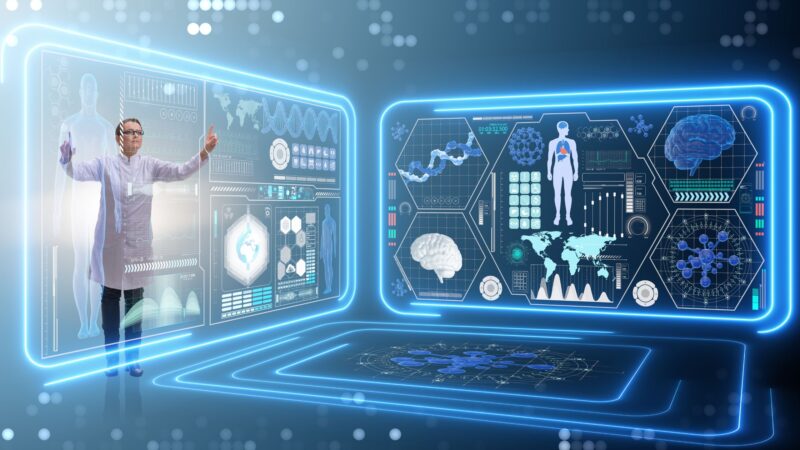Introduction to AI in Healthcare
The healthcare landscape is undergoing a transformative shift. At the forefront of this evolution is artificial intelligence (AI), a smart technology that’s revolutionizing medicine as we know it. From accelerating diagnoses to personalizing treatment plans, AI’s potential seems limitless. As hospitals and clinics adopt these advanced tools, patients are experiencing more efficient care than ever before.
Imagine walking into a doctor’s office where your medical history is instantly accessible through an AI interface, allowing for tailored recommendations on your health journey. This isn’t just a futuristic dream; it’s happening right now in many parts of the world. The integration of AI in healthcare goes beyond convenience—it’s improving outcomes and making healthcare smarter.
Let’s dive deeper into how AI is reshaping the medical field and what it means for both practitioners and patients alike.

Benefits of AI in Healthcare
AI in healthcare offers a multitude of advantages that are transforming patient care. First, it enhances diagnostic accuracy. Algorithms can analyze medical images faster and more precisely than human eyes.
Another key benefit is personalized treatment plans. AI systems sift through vast amounts of data to tailor therapies for individual patients, improving outcomes significantly.
Efficiency gains also stand out. Administrative tasks, like scheduling or billing, become streamlined when powered by smart technology. This allows healthcare professionals to focus on what truly matters—caring for patients.
Moreover, predictive analytics plays a crucial role in identifying potential health risks before they escalate into serious issues. Early intervention saves lives and reduces costs.
AI contributes to research acceleration. By processing large datasets quickly, it aids in discovering new medications and treatment protocols at an unprecedented pace.
Applications of AI in Medicine
AI is transforming medicine in various innovative ways. One significant application is in diagnostic imaging. Algorithms can analyze X-rays, MRIs, and CT scans with remarkable accuracy, sometimes surpassing human radiologists.
Another promising area lies in predictive analytics. By processing patient data, AI can identify potential health risks before they escalate into serious conditions. This proactive approach facilitates timely interventions.
Telemedicine also benefits from smart technology. Virtual assistants powered by AI help triage patients and provide initial consultations remotely, improving access to care for many individuals.
Drug discovery is yet another field where AI shines. Machine learning algorithms can predict how different compounds might behave in the body, expediting the development of new therapies while reducing costs.
Personalized treatment plans are becoming more common thanks to AI’s ability to analyze vast amounts of genetic information and medical history tailored specifically for individual patients’ needs.
Challenges and Ethical Considerations
The integration of AI in healthcare raises significant challenges and ethical considerations. Data privacy is a primary concern. Patient information must be handled with the utmost care to prevent breaches.
Bias in algorithms also poses a risk. If training data isn’t diverse, it can lead to unequal treatment outcomes for different demographics. This could exacerbate existing health disparities rather than alleviate them.
Accountability becomes murky as well. When an AI system makes a mistake, who is responsible? The developers, the healthcare providers, or the technology itself?
Informed consent is another complex issue. Patients should understand how AI influences their care decisions without overwhelming them with technical jargon.
These factors highlight the need for careful regulation and transparent practices in implementing smart technologies in medicine. Balancing innovation with ethical responsibility remains crucial for successful integration into healthcare systems.

Real-life Examples of AI in Healthcare
AI is making waves in healthcare, with many real-life applications transforming patient care. For instance, IBM’s Watson analyzes vast amounts of medical literature to assist doctors in diagnosing complex cases. This technology has proven instrumental for oncologists seeking personalized treatment plans.
Another exciting example comes from Zebra Medical Vision. Their AI algorithms analyze medical imaging data to detect conditions like pneumonia and cardiovascular diseases faster than traditional methods. Hospitals using this technology have reported improved diagnostic accuracy.
In mental health, Woebot uses conversational AI to provide support and cognitive behavioral therapy techniques through a chat interface. Patients can access assistance anytime, bridging gaps between appointments.
These instances highlight how smart technology is revolutionizing medicine daily, enhancing efficiency while empowering healthcare professionals to deliver better outcomes for patients across the globe.
The Future of AI in Healthcare
The future of AI in healthcare presents a landscape filled with possibilities. As technology advances, we can expect smarter algorithms capable of analyzing vast amounts of data more efficiently.
Imagine personalized medicine tailored to individual genetic profiles. AI could revolutionize treatment plans by predicting outcomes based on unique patient characteristics.
Telehealth will also evolve, enhancing remote care. Virtual assistants may guide patients through their health journeys, monitoring vital signs and offering real-time advice.
Moreover, the integration of wearable tech into daily life will provide continuous health insights. This shift allows for proactive interventions rather than reactive treatments.
Ethical considerations will shape this journey too. Ensuring patient privacy and transparency must remain at the forefront as these technologies develop.
Collaboration among tech developers, healthcare professionals, and policymakers is essential to harness AI’s full potential responsibly. The synergy between human expertise and smart technology is poised to transform how we approach medicine in remarkable ways.
Conclusion: Impact and Potential for the Future
The integration of AI in healthcare is more than just a trend; it represents a significant shift towards smarter, technology-driven approaches to medicine. The benefits are clear: improved accuracy in diagnostics, personalized treatment plans, and enhanced patient engagement. As we explore the wide array of applications—from predictive analytics to robotic surgeries—the transformative potential becomes evident.
However, as with any innovation, challenges remain. Ethical considerations surrounding data privacy and biases need careful navigation. These issues must be addressed if we are to harness the full power of AI responsibly.
Real-life examples illustrate AI’s promise across various sectors within healthcare. From virtual health assistants that provide medical advice at any hour to algorithms predicting patient deterioration, these advancements enhance both efficiency and effectiveness in care delivery.
Looking ahead, the future appears bright for smart technology revolutionizing medicine. Ongoing research and investment will further refine capabilities and broaden applications. As stakeholders work collaboratively—healthcare providers, tech innovators, regulators—the synergy between human expertise and artificial intelligence will likely lead us into an era where healthcare is more accessible, efficient, and tailored than ever before.
The landscape is evolving rapidly. With continued focus on ethical practices and innovative solutions driven by AI technologies, there’s immense potential for reshaping how we view health care globally—a new chapter awaits us all.








